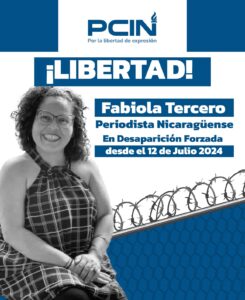It has been more than two months since Nicaraguan journalist Fabiola Tercero Castro disappeared following a raid on her home by members of the police in the country's capital, Managua.
On July 12, seven members of the police, under the command of Commissioner Lidia Baltodano, raided the journalist's home where she lived with her mother and seized Tercero’s computer and other work materials. Since then, no one has seen her. They also don’t know where she is.
Fabiola León, Latin America investigator for Reporters without Borders (RSF, for its acronym in French), told LatAm Journalism Review (LJR), that at the time of the raid, Tercero was able to notify friends and colleagues about the situation and the names of some of the police officers (including that of the Commissioner). That was the last they heard.
For organizations such as RSF and Independent Journalists and Communicators of Nicaragua (PCIN), the case is a “forced disappearance” since it has the characteristics of state forces being involved.
According to their records, Tercero’s disappearance is part of a new wave of persecution of journalism that includes a surveillance regime, police visits to homes without prior announcement, the obligation to appear before a police unit every 15 days and even notifying authorities of movements like going to the supermarket, Martha Irene Sánchez, director of the PCIN, told LJR.
RSF notes that this pattern of persecution and surveillance even affects journalists who have retired from the profession – those over 60 years of age – or journalists who have changed their job in search of keeping a lower profile.
“It’s something that has no form of justification, [it’s done] only to maintain the level of state terrorism,” Artur Romeu, director of RSF's Latin American office, told LJR.
According to Romeu, it’s precisely because of this regime to which Tercero was subjected as well as the conversations that the journalist had with colleagues before the raid, that “there are suspicions that she is being kept by the State, although we have no way of confirming it.”
“Obviously we hold the regime of [President] Daniel Ortega and [Vice President] Rosario Murillo responsible for what is happening with her,” Sánchez, from PCIN, said.

La organización PCIN es una de las que ha exigido información sobre el paradero de la periodista nicaragüense Fabiola Tercero Castro. (Cortesía PCIN)
On Sept. 5, when Nicaragua exiled 135 political prisoners, including journalist Víctor Ticay, Tercero was mistakenly announced as being among that group. Media outlet Divergentes spoke with some of the women who were released from La Esperanza, the women's prison where political prisoners are usually taken, who claimed not to have seen Tercero Castro in prison.
PCIN and RSF have also managed to find out that there are no records of Tercero’s presence in La Esperanza.
“We are still left with the great unknown of where she is. The big question we have is ‘where is our colleague Fabiola Tercero?’ It has been impossible to really have any trace of her whereabouts,” Sánchez said.
Tercero worked with the newspaper Hoy and then was a reporter and presenter for 100% Noticias, a well-known media outlet due to the fact that its directors and founders – Lucía Pineda and Miguel Mora – were imprisoned on Dec. 21, 2018 and accused, among other charges, of “promoting and inciting hatred and violence.” They were released on June 11, 2019 after spending six months in prison. The channel’s headquarters was raided on Dec. 21, 2018 and later turned into a rehabilitation center.
“She had decided that to remain in Nicaragua with her family she had to disassociate herself from journalism and do an activity that did not pose a threat to the regime,” Sánchez said.
For this reason, since 2017, she had distanced herself from the media to dedicate herself to the project “El Rincón de Fabi” (Fabi’s Corner) through which she promoted reading for children and adults. But even in that activity, she sought to have a low profile, Sánchez said.
For Sánchez, it is also significant that Tercero’s home is located in a sector near the house of Ortega and Murillo, so it was within the security perimeter of the president.
“So Fabiola was in their permanent focus,” said Sánchez, who highlighted that Tercero’s disappearance is “also the disappearance of her family.” Since July 12, no one has information about where the family is, either.
Tercero’s case also demonstrates Ortega's interest in “absolute control over information” in which anyone with any level of activism, be it cultural or social, is seen as a threat, Romeu said.
“Basically what this regime wants is not to leave a single journalist in Nicaragua whether they are working or not,” Sánchez said. “They simply want to sweep them away and create territories with an information blackout and a territory under total silence. So for them there is no possibility that anyone is even observing what is happening in Nicaragua.”
Despite the secrecy of the Nicaraguan State, Romeu insists on its obligation to speak on the matter. “What is true is that [Tercero] has been the target of an intimidation strategy by the State and that after this intimidation she has disappeared,” Romeu said.
“With Fabiola the only thing we can do and continue to do is ask for information about where she is and hold the regime responsible for anything that happens to her,” Sánchez said.